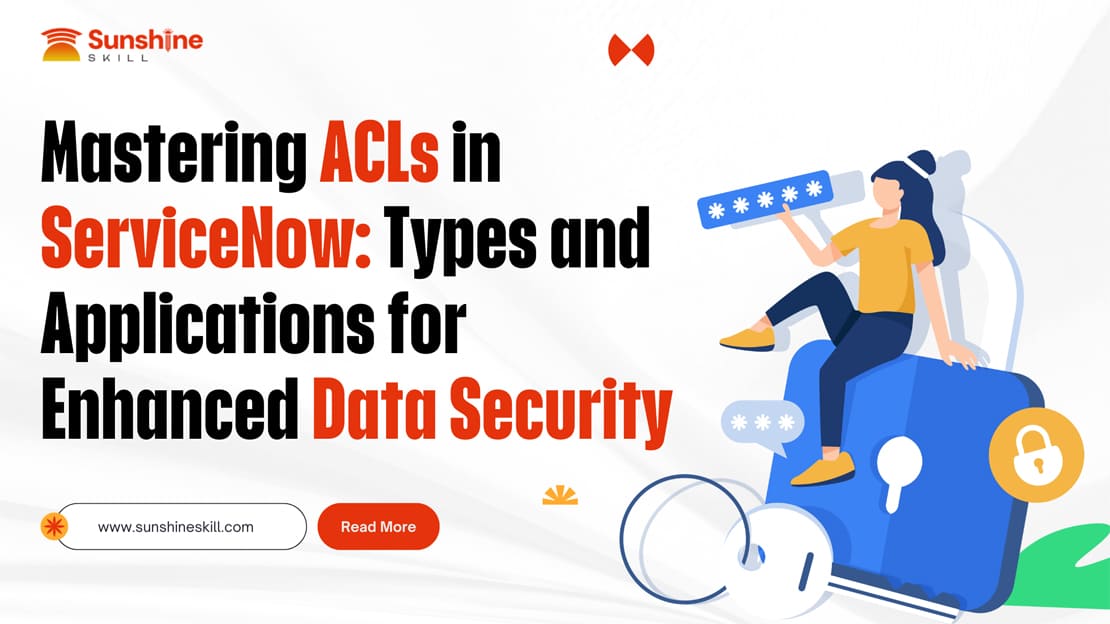
Introduction
Access Control Lists (ACLs) in ServiceNow are a fundamental element in securing data and ensuring that the right users have appropriate access to the right information. Mastering ACLs can significantly enhance data security and streamline operations within the platform. This blog post will explore the different types of ACLs, their applications, and how they contribute to robust data security in ServiceNow.
Types of ACLs
Record ACLs
Record ACLs manage access to specific records, determining who can read, write, or delete certain data. These ACLs are essential for maintaining the integrity and confidentiality of the data within ServiceNow. By defining who can interact with specific records, organizations can ensure that sensitive information is only accessible to authorized personnel.
Field ACLs
Field ACLs focus on individual fields within a record, allowing granular control over who can see or modify specific pieces of information. This level of detailed access control is particularly useful in scenarios where parts of a record contain sensitive data that should not be visible to all users who have access to the record itself. For example, in an employee record, salary information might be restricted to HR personnel only.
Scripted ACLs
Scripted ACLs provide advanced control by using scripts to evaluate complex conditions before granting access. These ACLs enable organizations to implement dynamic access controls that can evaluate multiple conditions and criteria in real-time. Scripted ACLs are powerful tools for scenarios requiring conditional access based on specific business logic or rules.
Applications of ACLs
Compliance with Data Privacy Regulations
One of the critical applications of ACLs in ServiceNow is ensuring compliance with data privacy regulations such as GDPR, HIPAA, and CCPA. By restricting access to sensitive information, organizations can prevent unauthorized access and protect the privacy of individuals. For example, only HR personnel might have access to employee records, ensuring that personal data is handled securely and in compliance with legal requirements.
Role-Based Access Controls
ACLs are instrumental in creating role-based access controls (RBAC). By defining access permissions based on user roles, organizations can ensure that users only have access to the data necessary for their role. This not only streamlines operations but also minimizes the risk of data exposure by limiting access to sensitive information. For instance, a customer service representative might only have access to customer interaction records, while a finance manager would have access to financial data.
Protecting Business-Critical Information
ACLs can be used to protect business-critical information from unauthorized access, safeguarding the organization’s intellectual property and competitive advantage. For example, access to strategic business plans, research data, or proprietary algorithms can be restricted to senior management or specific departments. This ensures that sensitive information remains confidential and is only accessible to those who need it for their work.
Enhanced Data Security
Minimizing Unauthorized Access
Implementing ACLs effectively enhances data security by minimizing the risk of unauthorized access. By defining clear and precise access controls, organizations can ensure that only authorized users can access, modify, or delete data. This reduces the potential for data breaches and ensures data integrity.
Providing an Audit Trail
ACLs provide an audit trail of access attempts, which can be invaluable for monitoring and investigating security incidents. This audit trail allows organizations to track who accessed what data and when providing critical insights in the event of a security breach or data leak. It also helps detect and respond to unauthorized access attempts promptly.
Building Trust with Customers and Stakeholders
Enhanced data security through ACLs not only protects sensitive information but also builds trust with customers and stakeholders. When organizations can demonstrate that they have robust access controls in place, it reassures customers and partners that their data is being handled securely. This trust is essential for maintaining strong business relationships and protecting the organization’s reputation.
Conclusion
Mastering ACLs in ServiceNow is crucial for any organization looking to enhance its data security and streamline access controls. By understanding the different types of ACLs, their applications, and their role in enhancing data security, organizations can leverage ServiceNow to its full potential. Implementing robust ACLs ensures that data remains secure, compliant, and accessible only to those who need it, ultimately contributing to a more secure and efficient IT environment.
In conclusion, ACLs are not just about restricting access; they are about enabling secure, efficient, and compliant operations within ServiceNow. As organizations continue to handle increasing amounts of sensitive data, mastering ACLs will be key to maintaining robust data security and operational efficiency.
